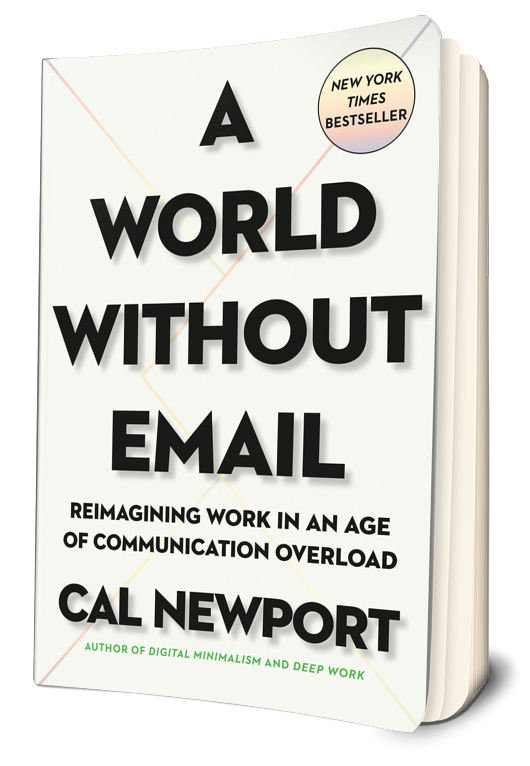In A World Without Email, a new working style without instant messaging, which is known to lower workplace productivity, is explored. In this paradise, people conduct their regular professional duties without using emails as a form of communication.
Your typical weekday usually looks like this: you arrive at the office, check your emails for the first hour, and then begin working on practical matters. After getting a coffee, you’ll probably check your emails once more. The first half of the day’s actual work doesn’t fully correspond to the hours spent in the office.

You spend more time during the day checking your inbox than working. But it’s okay since everyone else behaves in the same way. You then worry about the plenty of work you still have to do. So you decide to stay late and finish the job yourself. It might be simple to turn off notifications as the answer.
Practice teaches us that it’s not as simple as that. Instead, Cal Newport’s book A World Without Email makes the case that we should do away with the inbox altogether and find other ways to increase productivity and collaboration.
- Through the hyperactive hive mind workflow impact, emails destroy productivity.
- In the long run, management execution apps are much more effective than emails.
- It’s more likely that your employee will complete the task quicker and more effectively when you clearly define their duties.
Emailing and instant chatting have a significant negative impact on office productivity.
Everyone use email at work; it’s just the current state of affairs. Emails help teams collaborate better and keep us connected. Nice, huh? The businesses believed that. However, it appears that inbox-based communication can be more detrimental than beneficial.
Every six minutes on average, a worker checks their email. According to a research by RescueTime, we spend one-third of our working day managing our inboxes, and the typical knowledge worker puts in an hour and fifteen minutes each day of productive work.
These depressing statistics primarily result from our addiction to emails and notifications. They are being pushed by organizational cultures to maintain the collaborative flow and improve responsiveness. The idea behind this is a nice one.
We are designed to only pay attention to one thing at a time, which is why. Additionally, the prefrontal cortex does not like it when we work with information in the background and keep a lot of tabs open. The outcome? reduced focus, diminished attention, and a rise in tension.
Emails must be replaced with project management execution tools if we want to increase productivity.
Emails are no longer effective for assigning projects, and for good reason. They shorten employees’ attention spans by keeping a tab open all the time. Additionally, they become disorganised and dirty.
Business theorists like Peter Drucker, on the other hand, have superior suggestions for enhancing the workflow. Knowledge workers and factory-style workers were both recognized by Drucker as distinct sorts of labor.
When workers in factories divide their tasks into smaller portions and are each in charge of a limited area of activity, they are most productive. With knowledge employees, things become a little more challenging because you can’t control their creativity or tell them how to think creatively.
What you can do, though, is to alter their procedures or organizational structure. Task assignment is a specialty of apps like Trello or Flow, which significantly reduce the need of email in the process. Because emails do, as we all know, reduce productivity, this is wonderful news.
Make sure to involve staff in the new workflow and allow them decision-making freedom. Always confirm with them to see if they approve of the modifications and what assignments they would want to get.
People function best when given simple, well-organized tasks.
Emails are a fantastic tool for communication, but what happens when we are at a loss for words? The majority of the time, they hinder productivity. The issue with emails is that, despite the fact that they are completely unproductive, people nonetheless feel accomplished after writing and reading them.
Management personnel have frequently observed how duties and justifications are passed about since nobody is truly sure how to handle them. Frequently, responsibilities are given incorrectly, are not in accordance with deadlines or goals, or are unclear to the person receiving them.
A world without email book review
An insightful article on the future of work without email, instant messaging, and quick collaborative text apps can be found in A World Without Email.
The book depicts the ideal workplace as one in which workers are given tasks with clear deadlines and responsibilities that they can complete without exchanging back and forth emails about them.
Doesn’t that sound fantastic? Everything takes place on management apps that are watched over by disseminators, and productivity increases as an externality. We’ll have to give it a shot to verify this, it seems.
If you really like this “A world without email book summary“ by Growthex then you can also check out some more amazing posts which is freely available on this platform :
- The Wisdom of Ratan Naval Tata: 7 Life Lessons to Transform Your Journey
- Unlocking Success: 7 Transformative Life Lessons from APJ Abdul Kalam
- Nature’s Wisdom: 7 Life Lessons for a Fulfilling Journey
- The Joyful Journey: Discovering Happiness through ‘The Happiest Man on Earth’ – Summary, Notes, and Quotes
- Unleashing the Magic of ‘Doglapan’ by Ashneer Grover: A Captivating Book Summary
To Watch great book summary explanation videos in Hindi language then visit : THIS YOUTUBE CHANNEL
Get the most out of every book you read. Growthex.org provides free, high quality summaries of books to help you make the most of your reading time.
Unlocking the power of knowledge, one book at a time. Growthex.org – the home for free, high-quality book summaries. Learn something new today.